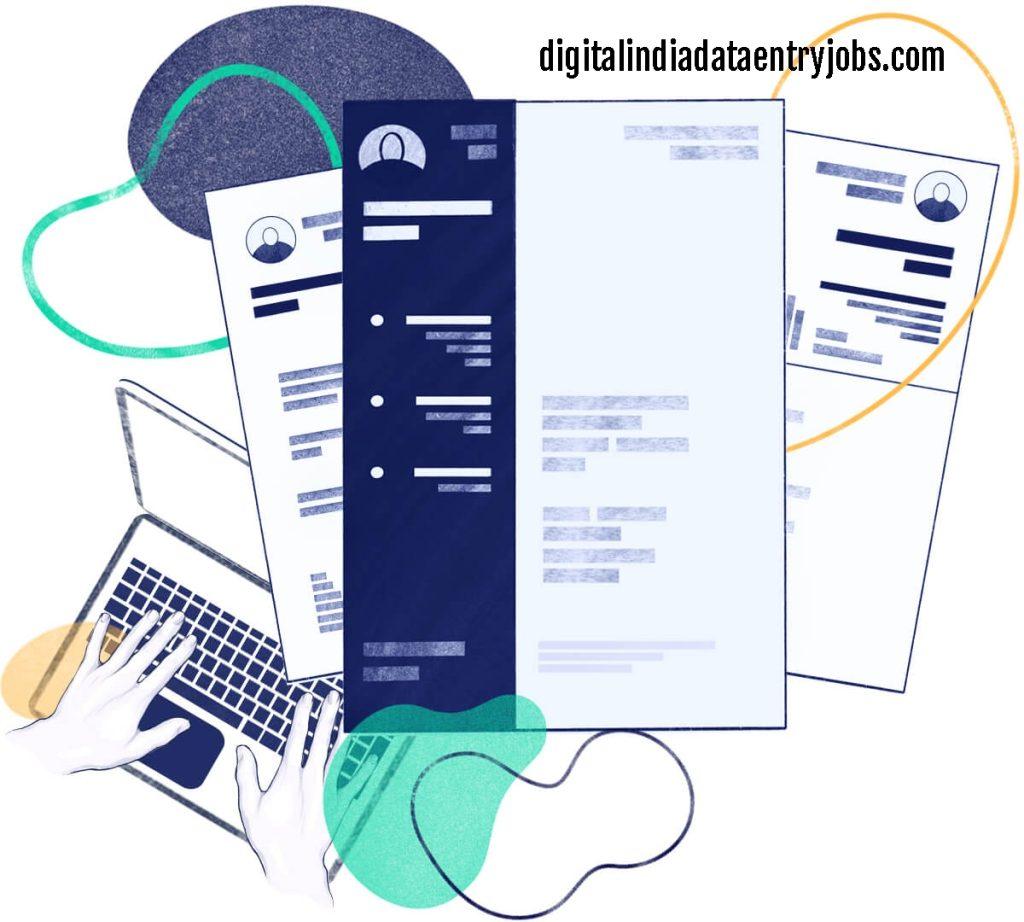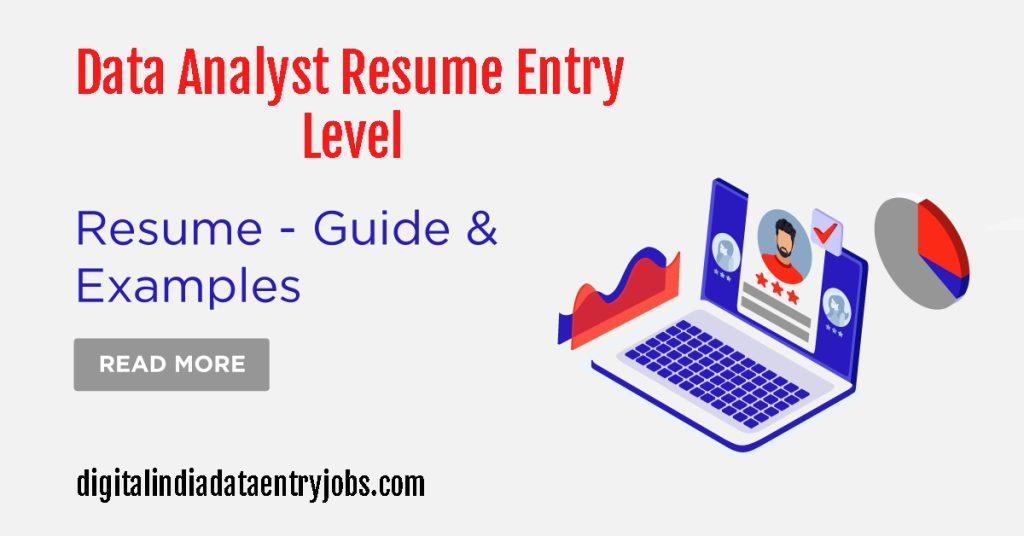Data Analyst Resume Entry Level:- When you have an ardor for running with numbers and problem-solving, you’ll be interested in an entry-level facts analyst position. records analysts work in diffusion of different industries, so regardless of what your historical past is, there could be an information analyst position that is right for you. By way of reviewing key strategies for the way to write an excellent records analyst resume for entry-stage specialists, you could boom your chances of locating a task possibility on this subject.
In this text, we speak about statistics analysts, speak approximately what they do, list some steps for writing an effective entry-degree facts analyst resume, and provide a template and instance if you want to use it.
Contents
What is a data analyst?
Technical experts who interpret sizable data sets are known as data analysts. They provide firms with practical actions to assist them enhance their operational efficiency, and they operate in a variety of different industries. Usually with a background in science, math, or technology, data analysts use this knowledge to efficiently evaluate pertinent business data. Data analysts can find themselves employed as entry-level employees or as senior advisors, depending on the type of organization.

Also Read:- Data Entry Clerk, Uidaionlineaadharcard, Mobilenumbertrackeronline
What do entry-level data analysts do?
Throughout the course of a typical workday, data analysts execute a multitude of different tasks. Even though their main responsibility is to review pertinent business data, they may use different techniques in their assessments. When working as an entry-level data analyst, you will usually be working under the direction of a supervising analyst. An entry-level data analyst may do the following duties, to name a few:
Collecting and cleaning data
In order for entry-level data analysts to do a thorough evaluation, they are usually in charge of gathering and cleansing data. Analysts classify the data and transform it into a format that is readable by their system while cleaning it. Working as an entry-level data analyst requires you to clean data because you may be preparing this information for your supervisor.
Analyzing data
Once the data cleansing procedure is complete, the information interpretation task may fall to entry-level data analysts. In order to find relevant information for a corporation, analyzing data entails examining what the examiner may learn from various facts and numbers. For instance, marketing analysts may research target demographic information to learn more about the target market for the company. Analysts examine the data in an effort to identify patterns that can guide operational decision-making inside the organization.
Producing reports
Report writing is another essential responsibility for entry-level data analysts. In a corporation, these entry-level workers produce paperwork or presentations for senior analysts. Their colleagues will have an easier time understanding the pertinent findings if they produce reports that are clear and useful.
How to write an entry-level data analyst resume
Writing a polished CV that emphasizes your qualifications is crucial if you’re searching for an entry-level data analyst career. To create a strong CV for a position as an entry-level data analyst, follow these steps:
1. Select a professional format
Choose the resume format you want. When drafting a resume, it is imperative that the hiring manager finds the document to be well-organized and visually appealing. It’s beneficial to pick a format for your professional resume that permits you to contain detailed information and makes use of a readable typeface. Look over various templates online if you don’t know where to start.
2. Begin with your contact information
Adding your contact details is the next step after choosing a format. Including your name, contact information (phone and email), and résumé is crucial. Make sure to find out if an employer needs a professional portfolio or any other type of additional identification. It is a good idea to carefully read the application before sending your CV to ensure that you have included all the needed information.
3. Write a professional summary
Put your most pertinent skill sets and career objectives in a two- or three-sentence professional summary that you should put below your contact information. A hiring manager may be particularly interested in learning more about your school background and accomplishments if you are an entry-level applicant. You can also talk about experiences from volunteer work, internships, and on-campus clubs at universities.
4. List your work history
In the resume’s primary body, emphasize your past employment. An explanation of your past employment allows the recruiting manager to gauge your level of knowledge. A few words outlining the primary responsibilities of each position should go under each heading. You can be a novice in this field when applying for an entry-level data analyst job. Consider summarising how each of your prior roles helped you prepare for this new career if you haven’t held any relevant positions.
5. Mention your professional skills
List a few of your pertinent professional talents in addition to your employment background. You can demonstrate to the hiring manager that you understand what it takes to succeed in this work by listing some relevant abilities when applying for an entry-level data analyst position. Since data analysts are technical experts, you should think about adding some appropriate software and hardware expertise. Giving the hiring manager a list of your soft skills might help demonstrate to them your capacity for teamwork.
6. Include your educational background
It’s common knowledge among hiring managers who examine entry-level applications that candidates may lack professional experience, therefore it’s crucial to highlight your educational background. In the event that you lack professional experience, it’s crucial to list any academic degrees you have earned that have assisted you in developing critical thinking, teamwork, and technological proficiency. You should think about including any relevant credentials you may have on your CV.

Also Read:- Data Entry Work from Home, Companycontactdetail, scholarships gov
Important skills for entry-level data analysts
You could wish to list the following competencies on your resume for an entry-level data analyst position:
Mathematics
Strong arithmetic abilities can be crucial for this position as data analysts work with numbers a lot. It is beneficial to include your math ability in the abilities part of your resume. If you have any math-related academic accomplishments, you might want to bring them up in your professional summary while talking about your skills. You can also talk about how your proficiency in arithmetic contributed to your success in previous positions.
Technology
Strong technical abilities can be crucial because working as a data analyst usually entails spending time with computers. By listing your technical skills on your resume, you may demonstrate to the hiring manager that you have the know-how to carry out your responsibilities. Listing computer software or programming languages that you frequently use can be useful when showcasing your technical skills.
Attention to detail
In your capacity as a trainee data analyst, it is crucial that you generate error-free reports. The senior analysts may depend on you to carry out your responsibilities accurately in this capacity since you may need to help them with their work. Since it enables you to find mistakes before submitting your documents for review, attention to detail might be a valuable trait for this role.
Communication
After completing an assessment procedure, entry-level data analysts frequently have to present their findings to a senior-level manager. Making reports and presentations for senior staff members may fall under your purview as an entry-level data analyst. You can use your favorite speaking style to effectively communicate your points if you have strong communication abilities.
Top Skills & Keywords for Entry-Level Data Analyst Resumes:
Hard Skills
- Data Analysis and Visualization
- SQL and Database Management
- Excel and Spreadsheet Analysis
- Statistical Analysis and Modeling
- Data Cleaning and Preprocessing
- Data Mining and Machine Learning
- Programming Languages (Python, R, etc.)
- Data Warehousing and ETL Processes
- Dashboard Creation and Reporting
- Business Intelligence Tools (Tableau, Power BI, etc.)
- Data Quality Assurance and Testing
- Data Governance and Security
Soft Skills
- Attention to Detail and Accuracy
- Analytical and Critical Thinking
- Problem Solving and Troubleshooting
- Communication and Interpersonal Skills
- Time Management and Prioritization
- Adaptability and Flexibility
- Teamwork and Collaboration
- Self-Motivation and Initiative
- Creativity and Innovation
- Data Visualization and Presentation
- Technical Aptitude and Proficiency
- Continuous Learning and Improvement

Also Read:- Remote Data Entry, indnewsupdates.com, Onlinereferjobs
FAQs
Q.) What is the recommended length for an Entry Level Data Analyst resume?
Ans. Generally, a one-page resume is adequate for entry-level data analysts. Given the possibility of your lack of previous job experience, emphasize your schooling, relevant internships or projects, and your talents and abilities. When summarising your experience and accomplishments, use succinct language and bullet points. Whenever feasible, include a numerical value for your successes. Put the most recent and pertinent information first, and modify your resume for each job application to highlight your suitability for the position. Make every word matter on your resume because the main objective is to persuade companies of your abilities and potential.
Q.) What is the required length for an entry-level data analyst resume?
Ans. Your entry-level data resume should ideally fill a single, attractive page. However, a shorter resume is preferable to one with a lot of filler material. Recall that hiring managers are aware of your application for an entry-level position and do not anticipate a long professional history. Your resume should demonstrate your ability to perform the job, not just that you have done it.
#Saras

